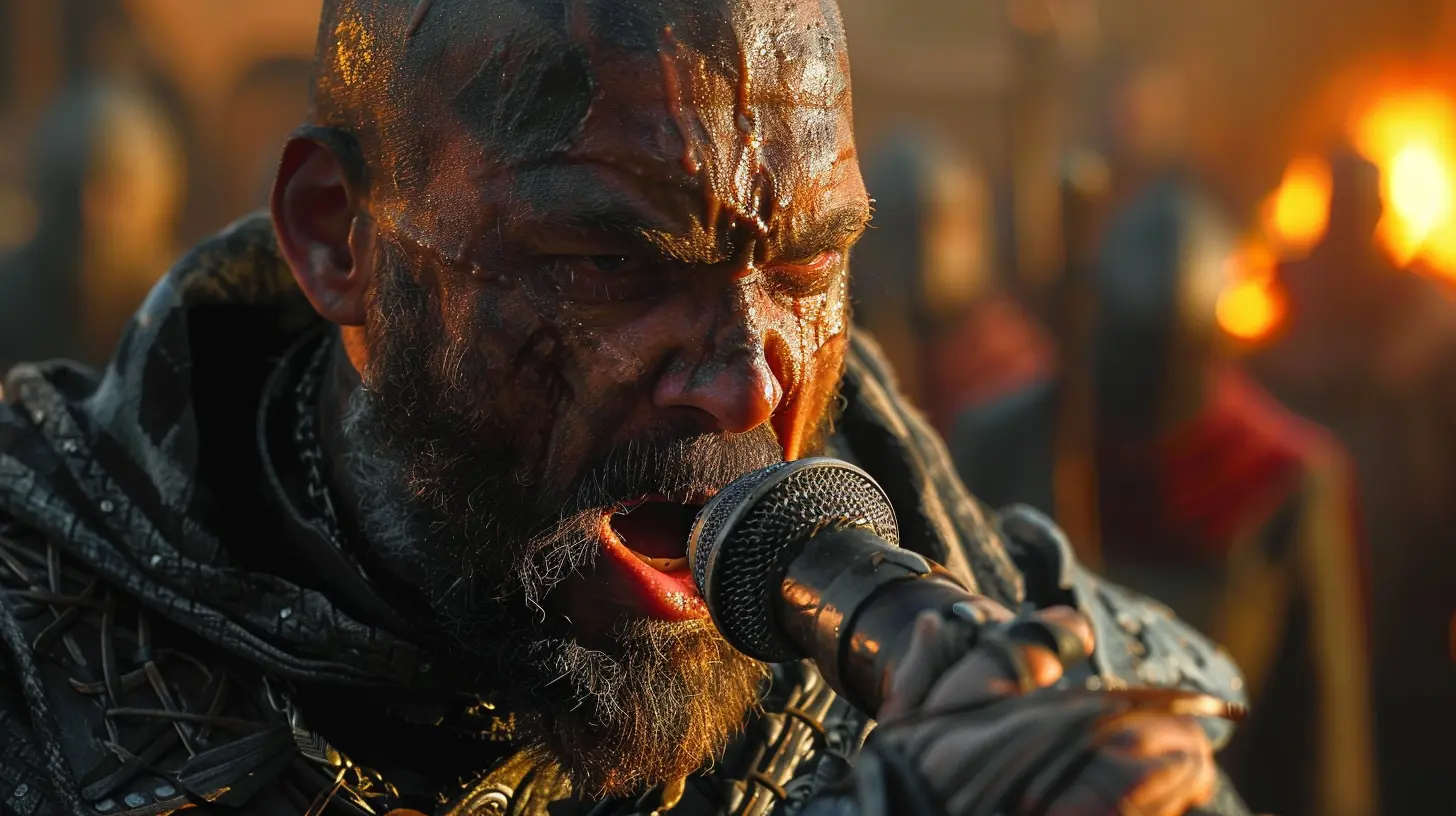How Game Voice Actors Maintain Vocal Health in Demanding Roles
9 October 2025
If you’ve ever played a video game, you've probably been blown away by the voices behind the characters. From the intimidating growl of a villain to the hopeful tone of a hero, voice actors bring these characters to life. But have you ever stopped to think about what it takes to produce these powerful performances day in and day out? Here’s the kicker: voice acting is physically demanding—especially for those intense gaming roles that require shouting, screaming, or switching between a dozen emotions in a single scene.
Voice actors don’t just roll out of bed, hop into the recording booth, and magically sound perfect. No, they have to work hard to protect and maintain their most important tool: their voice. Let’s dive into the world of gaming voice actors and uncover how they keep those vocal cords in tip-top shape despite the pressures of demanding roles.
The Importance of Vocal Health in Voice Acting
First things first: why is vocal health so crucial for voice actors? Think of their voice as a professional athlete’s body. Just like athletes stretch, train, and ice their muscles, voice actors have to care for their vocal cords to avoid injury. Unlike a bruised knee that can heal with rest, a damaged voice can take weeks—or even months—to recover. And when your paycheck depends on how you sound? Yeah, that’s a nightmare scenario.In the video game industry, voice actors often have to perform extreme vocal tasks, whether it's yelling a battle cry, delivering lengthy dialogue with pinpoint precision, or mastering a range of character voices. Without proper care, their voice could crack under the pressure—literally. 
The Challenges of Gaming Voice Acting
Voice acting for video games is not like recording a calm audiobook. Nope, it’s a wild ride full of intense demands.1. Screaming and Shouting
Think about it. How many times have you heard a character scream, grunt, or yell during combat in your favorite game? Those sounds don’t just appear spontaneously; voice actors spend hours recording high-intensity lines like “Grenade!” or “Fire in the hole!” Sure, it might sound cool in the game, but screaming into a mic repeatedly can shred vocal cords if done incorrectly.2. Long Recording Sessions
Recording sessions for video games can stretch on for hours, often involving hundreds (yes, hundreds) of lines. The repetition and precision required for each take—whether it’s a whisper or a full-throated roar—can seriously strain the voice.3. Vocal Range Demands
From playing a grizzled warrior one moment to a wisecracking alien the next, video game actors have to switch between wildly different characters. This vocal acrobatics can put their vocal cords through a marathon of highs, lows, and everything in between.
How Voice Actors Keep Their Voices Healthy
So, how do they do it? How do voice actors avoid wrecking their voices while still delivering those epic performances that make our games unforgettable? Let’s break it down.1. Hydration is Non-Negotiable
If there’s one thing every voice actor swears by, it’s staying hydrated. Water is to a voice what oil is to an engine—it keeps everything running smoothly. Most voice actors stick to room-temperature water (ice-cold drinks are a no-go). Many also sip on herbal teas to soothe and coat their throats. Chamomile, honey, and lemon? That’s the golden trio for a lot of folks in the industry.2. Warming Up the Voice
You wouldn’t start running a marathon without stretching your legs, would you? Voice actors apply the same idea to their vocal cords. Vocal warm-ups—like humming, lip trills, and gentle pitch slides—are essential before stepping into the booth. These exercises gently prepare their voice for the dynamic range they’ll need to nail those epic performances.3. Taking Vocal Breaks
Ever felt the strain of talking non-stop for hours? Now imagine doing that while acting out dramatic scenes! Voice actors know the importance of giving their vocal cords a break. Many take 5-10 minute breaks during recording sessions to rest and recharge. It’s like hitting "pause" to avoid burnout.4. Using Proper Techniques for Intense Lines
Here’s where training makes a huge difference. When screaming or shouting, professional voice actors learn how to project from their diaphragm rather than straining their throat. It’s a bit like learning to sing—it looks effortless when done right, but there’s a lot of technique behind it.For example, instead of yelling from their throat (which can cause serious damage), seasoned voice actors focus on controlled breathing and projecting sound from deep within their core. It’s all about working smarter, not harder.
5. Steaming for Recovery
Steam sessions are a lifesaver for overworked vocal cords. After a grueling day of recording, many voice actors turn to steam inhalers or showers to hydrate and relax their vocal folds. Think of it as a spa treatment for the voice.6. Avoiding Vocal Strain Off the Clock
Funny enough, many voice actors are super cautious about how they use their voice outside of work. That means no yelling at sports games, no over-the-top karaoke nights, and definitely no chatting loudly in noisy bars. They treat their voices like delicate instruments—because, really, that’s what they are.
Lifestyle Choices That Make a Difference
Beyond the booth, the lifestyle choices voice actors make can make or break their vocal health.1. Getting Enough Sleep
Sleep is the ultimate recovery tool—for the body and the voice. Without enough rest, vocal cords can feel strained, and performances can suffer. A solid night’s sleep is non-negotiable for voice actors who want to stay at the top of their game.2. Avoiding Irritants
Here’s a fun fact: caffeine and alcohol can dry out vocal cords. That’s why many voice actors limit or avoid these entirely before recording. Smoking? That’s an absolute no-go. Even exposure to allergens or dusty environments can mess with their voice.3. Eating the Right Foods
Certain foods—like spicy dishes or dairy—can wreak havoc on the throat. Spicy foods can irritate, while dairy can cause excess mucus (not exactly ideal when you’re belting out a victory cry). Instead, voice actors often stick to throat-friendly snacks like apples or light broths.The Role of Training and Coaches
Behind almost every successful gaming voice actor is a vocal coach. These coaches help actors improve their range, learn proper techniques, and troubleshoot any bad habits. Think of them like personal trainers for the voice!Many voice actors also continually take workshops or lessons to stay sharp. The gaming industry evolves quickly, and being adaptable is crucial to staying relevant.
When Things Go Wrong: Recovering from Vocal Strain
Even with all the right precautions, accidents happen. When a voice actor starts to feel the signs of strain—like hoarseness or loss of range—they take it seriously. Rest is the first step. Many also turn to professional speech therapists or ENT specialists for guidance.In extreme cases, an actor might have to turn down roles or limit their workload to allow their voice to heal. It’s a tough decision, but it’s far better than risking permanent damage.
Wrapping It Up
So, there you have it—a behind-the-scenes look at how game voice actors keep their voices in fighting shape. It’s not just about talent; it’s a combination of skill, self-discipline, and a dash of science. These incredible performers bring our favorite characters to life, all while juggling the unique challenges of such a demanding profession.The next time you’re playing a game and feel goosebumps from a character’s voice, remember this: that performance didn’t just happen on a whim. It’s the result of hours of hard work, preparation, and most importantly, vocal care.
all images in this post were generated using AI tools
Category:
Voice Acting In GamesAuthor:

Tayla Warner
Discussion
rate this article
1 comments
Bethany McCool
What a fantastic read! It's so inspiring to see how dedicated voice actors are to maintaining their vocal health, especially in such demanding roles. Their techniques and passion truly highlight the artistry behind gaming. Thanks for shedding light on this important aspect of voice acting—looking forward to more insightful articles!
October 13, 2025 at 5:05 AM

Tayla Warner
Thank you for your wonderful feedback! I'm glad you found the article inspiring. Voice actors truly bring a unique artistry to gaming, and their dedication to vocal health is vital. Stay tuned for more insights!


